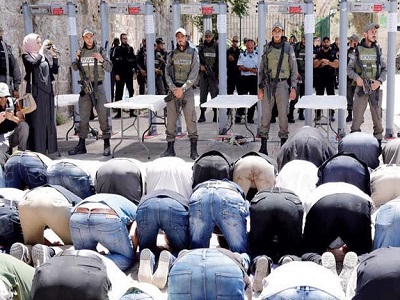
The Israeli security cabinet decided during a meeting late on Monday night to remove metal detectors, which had recently been installed at the entrances of the Al-Aqsa Mosque compound, only to replace them with more advanced surveillance technology in the Old City of occupied East Jerusalem.
Israeli authorities installed metal detectors, turnstiles, and additional security cameras in the compound following a deadly shooting attack at Al-Aqsa on July 14 – sparking protests from Palestinians, who said the move was the latest example of Israeli authorities using Israeli-Palestinian violence as a means of furthering control over important sites in the occupied Palestinian territory and normalizing repressive measures against Palestinians.
Religious leaders in Jerusalem held a meeting on Tuesday to discuss the new Israeli plan, as Islamic endowment (Waqf) official Sheikh Raed Daana told Ma’an on Monday that both religious leaders and the Palestinians wouldn’t accept any changes to the status quo.
Israel removes Jerusalem metal detectors, Palestinians reject new restrictive measures https://t.co/Oiu9t5Ez79 pic.twitter.com/l6gxH4P2Nh
— The IMEU (@theIMEU) July 25, 2017
Following the meeting, Waqf Council chairman Sheikh Abd al-Athim Salhab said that the Waqf would issue a report evaluating the overall situation in and around the Al-Aqsa compound before deciding whether to resume prayers inside Al-Aqsa or to continue demonstrations.
In the meantime, the cabinet said that Israeli police forces’ increased presence in the Old City would be maintained, adding that the plan could include hiring additional officers “in accordance with the recommendation of the police.”
According to Israeli news outlet Ynet, the new security measures include the installation “smart cameras” capable of facial recognition and heat-sensing technology to detect possible weapons or explosives.
#UPDATE Turkish President Erdogan urges Muslims to visit and protect Jerusalem after violence over metal detectors https://t.co/cHEkDAVMcQ pic.twitter.com/4WOTYWW6HC
— AFP news agency (@AFP) July 25, 2017
During the weekly Palestinian Authority (PA) meeting on Tuesday, Prime Minister Rami Hamdallah held Israel responsible, as the occupying force, for tampering with the fragile status quo at Al-Aqsa and attempting to erase Jerusalem’s Palestinian identity.
Hamdallah called the Israeli security measures “unacceptable,” and maintained that Israeli authorities should restore the status quo prior to the July 14 attack, adding that the PA had allocated $25 million to support Palestinian “citizens, merchants, and organizations in Jerusalem.”
“It’s not about technology, it’s about control,” a resident of Jerusalem told Ma’an. “It’s about who controls the gate of the mosque, which means who controls the mosque.”
Israel has removed controversial metal detectors at the entrance to al-Aqsa mosque compound pic.twitter.com/X5DWv4zBAZ
— Press TV (@PressTV) July 25, 2017
Jamal Zahalqa, a member of the Knesset and a leader of the Joint List representing Palestinian citizens of Israel, told Ma’an that the removal of the metal detectors was one victory amid a larger struggle in East Jerusalem, and that Palestinians would continue to refuse to enter Al-Aqsa until Israel pulled back all of its measures at the holy site.
According to the Palestinian Red Crescent, at least 1,090 Palestinians had been injured since July 14 during demonstrations protesting the metal detectors, which were violently repressed by Israeli forces across the occupied Palestinian territory. Eleven Palestinians and five Israelis have been killed since July 14.
On Sunday, United Nations Special Coordinator for the Middle East Peace Process Nickolay Mladenov warned of the broader repercussions a sustained crisis in Jerusalem could have.
Palestinians fear Israeli measures will lead to partitioning Al Aqsa mosque similar to Ibrahimi mosque in Hebron https://t.co/EyoG2rzUMt
— Mondoweiss (@Mondoweiss) July 25, 2017
“Jerusalem is perhaps one of the most critical cities in the world. It is an emotionally, religiously and historically charged place for billions of people,” Mladenov said in front of the UN Security Council during an emergency session on the developments at Al-Aqsa.
“Nobody should be mistaken that these events can be localized,” he added. “In fact, they may be taking place over a couple of hundreds square meters in Jerusalem, but they affect hundreds of millions, if not billions, of people around the world. They have the potential to have catastrophic costs well beyond the walls of the old city, well beyond Israel and Palestine, well beyond the Middle East itself.”
(Maan, PC, Social Media)




